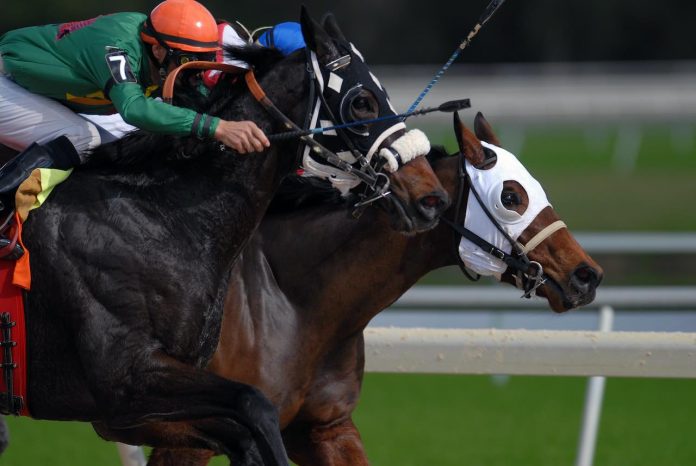The Melbourne Cup, the race that stops a nation, stunned a nation in 1969.
Just minutes before the start of Australia’s premier horse race, came a dramatic announcement over Flemington’s loud-speakers: hot favourite Big Philou was scratched.
Walking away from Flemington, a recent arrival in Melbourne from Perth and joining The Australian newspaper – age 20 and with nil knowledge of horses – I was about to be assigned to cover the story.
Revelations rolled-out in Melbourne Magistrate’s Court, day-after-day: Police allegations, witness lies and wild allegations behind the doping of one of Australia’s greatest racehorses.
Big Philou, being walked just before the 4 November race, had dropped his head and “looked very distressed” said trainer Bart Cummings’ veterinary surgeon, John Brydan.
The horse was led back to his stall.
Veterinary surgeon of the Victoria Racing Club, Dr J. Bourke, declared Big Philou unfit to race.
“The whole of Australia was agog with what had happened,” leading defence lawyer Mr K. Murray told the trial of horse strapper Leslie Lewis.
He told the court: “It is not a criminal offence to dope a racehorse”.
But conspiring to commit an offence is.
And Lewis, 28, was charged with unlawfully conspiring with another to administer a substance to the racehorse.
He was also charged with inciting another person to conspire in the drugging of another horse, King Pedro.
Lewis pleaded innocent.
Mr Murray said: “There is no direct proof of conspiracy; the only evidence of conspiracy is circumstantial.
“Anyone could have got over the fence and thrown Danthron (a powerful laxative) into the food. It’s odorless and tasteless.”
Magistrate Mr R. Kelly agreed with Mr Murray that key witness against Lewis, strapper Barry Becker, was “a liar, a cheat and a thief.”
This, however, didn’t mean Becker was giving false evidence, said the magistrate.
Then a bombshell.
The name of Australia’s famous horse racing family – Waterhouse – was introduced.
Prosecutor Mr R. Perry said: “It is clear Lewis phoned Sydney and it is clear he made the calls to Stanlight Investments of which William Waterhouse and John Waterhouse are directors.
“Why, if Lewis wanted to start afresh in New Zealand with another name, did he leave an outstanding account with the State Savings Bank?”.
Becker, 25, told the court that Lewis admitted to him in Pentridge Gaol to doping Big Philou.
Lewis also passed a note to Becker offering “10 big ones to nod your head.”
When Lewis said it was $10,000, Becker asked him: ‘Where will you get the money?’
“Lewis said: Mr Waterhouse.’”
Lewis had mentioned a frizzy ball wrapped in tissue paper and Becker said he would “carry on with it.”
In a 40-page statement to police, Becker claimed he had doped Big Philou. A policeman told him he was “telling a pack of lies.”
Questioned on his criminal record, Becker said that up to three months before the Cup, he: “got in more trouble. I got shot in the back by police.”
Mr Murray: “Why were you shot in the back by police?”
Becker: “I smashed a window.”
He said that in Pentridge he asked Lewis for an outline of the stables.
“I got a verbal outline but I’m not real bright. I couldn’t follow it. I told him it wasn’t good enough. I wanted a plan.”
Big Philou, trained by Bart Cummings, was often ridden by champion jockey Roy Higgins. Both men thought Big Philou was a shoo-in for the Cup. It was massively-backed despite the entry of previous Cup winner, Rain Lover.
I wagered 50c. It could be collected after the scratching but the queue wasn’t worth the wait.
Higgins was disgusted at the doping: “If it was another 20 minutes down the line, that horse could have collapsed and brought half the field down. Killed me, killed others, killed horses, you know.”
Lewis was sacked by Mr Cummings four months before the Cup.
Despite the best attempts by the courts, lawyers, police and racing investigators, the truth didn’t emerge until years later.
Suffering cancer, Lewis confessed on his death-bed to poisoning Big Philou and another runner.
He mentioned $10,000 but declined to name who paid it.
Big Philou eventually recovered, winning the 1970 Queen Elizabeth Stakes and Underwood Stakes.
Before retiring, he beat Rain Lover, who had won the 1969 Melbourne Cup.



































